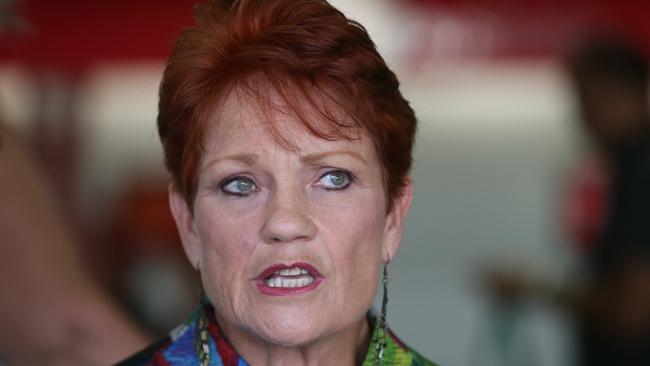One Nation’s voter slip gives a lift to both major parties
Pauline Hanson’s support nosedives, handing the Coalition its equal-best primary vote since just after the last election.

Pauline Hanson’s support has nosedived, handing Scott Morrison the equal-best primary vote for the Coalition since just after the last election but also strengthening Labor’s lead.
The first Newspoll since the May 18 election was called in the wake of the Coalition’s budget and Bill Shorten’s budget-in-reply speech puts the major parties neck and neck on a primary vote of 39 per cent each.
With preferences from the Greens, Labor has maintained a two-party-preferred lead of 52 per cent to 48 per cent, representing a 2.4 per cent swing against the Coalition based on the last election, representing the potential loss of 10 seats for the Prime Minister.
Going into the first full week of the campaign, Mr Morrison enjoys an unchanged 11-point lead over the Opposition Leader as preferred prime minister.
The Prime Minister will today head back to Melbourne to announce further infrastructure projects in a state that, alongside Queensland, the Coalition believes could hold the key to the election outcome, with population being a hot-button issue.
Mr Shorten was in Sydney yesterday, where he was campaigning behind enemy lines in the Liberal-held seat of Reid, before returning to Melbourne last night. Today he is expected to keep the pressure up on health funding.
With less than five weeks to go before the poll, the Coalition has built on a two-point jump in its primary vote two weeks ago by adding a further point in the latest Newspoll, which began surveying voters on the day the election was called. This has come at the expense of One Nation, which has crashed to 4 per cent in the wake of the guns-for-funds scandal, with popular support falling nationally to its lowest point since 2016.
The Newspoll showed Mr Morrison had recovered all the ground lost since the removal of Malcolm Turnbull, with the best primary vote for the Coalition since July 30 last year. This has been the Coalition’s high water mark since September 2016, just two months after the last election.
Labor’s two-point jump fortifies the party’s election-winning lead despite still being down on a high of 41 per cent in the wake of the Liberal Party leadership spill in August last year.
The fall in One Nation support has shifted the electoral dial and delivered the major parties a higher combined primary vote than that recorded at the last election.
Having peaked at 11 per cent of the national primary vote less than two years ago, Ms Hanson’s conservative minor party has fallen to a low of 4 per cent in the latest poll, marking a further two-point decline in the past two weeks.
One Nation, which enjoys its highest popularity in Queensland, managed 1.3 per cent of the national primary vote at the last election.
However, it managed to snatch four Senate spots — two in Queensland, one in NSW and one in Western Australia. Changes to the Senate voting system under the Turnbull government cost the minor party a potential fifth spot.
Senior LNP sources said One Nation was still strong in marginal central Queensland seats, which meant the party could still be a deciding factor in the outcome of the election. However, the source said the party’s vote would have “come off” in southeast Queensland and NSW following the guns scandal.
The collapse in support for the right-wing nationalist party follows rolling scandals, including the recent secret recording of staffer James Ashby offering to try to water down Australia’s gun laws in an attempt to solicit a $20 million donation from the US gun lobby in footage recorded by an Australian Al-Jazeera reporter posing as the head of a fictitious firearms lobby group “Gun Rights Australia”.
Last month, following the guns-for-funds scandal, Mr Morrison vowed to put One Nation below Labor on Liberal how-to-vote cards. “I’m not interested in getting One Nation’s preferences. I’m interested in getting their primary vote,” he said.
In the latest exclusive Newspoll, the total vote for independents and minor parties, including the Greens, has now fallen to 22 per cent, which is below the combined result in the 2016 poll and well down on the peak of 29 per cent recorded in Newspoll in the middle of 2017.
Support for “others”, which includes Clive Palmer’s United Australian Party, fell from 10 per cent to 9 per cent, which represents a 2.7-percentage-point decline since the election.
The Greens remained unchanged on 9 per cent, which is a 1.2 percentage point swing on the last election result.
Newspoll surveyed 1697 voters nationally, in both city and country electorates, between April 11 and April 14.
The poll began its surveys immediately after Mr Morrison called the election.
The approval ratings for both leaders remained virtually unchanged as Mr Shorten hit the hustings in Reid for the third time since the election was called and Mr Morrison attended a rally in Brisbane.




To join the conversation, please log in. Don't have an account? Register
Join the conversation, you are commenting as Logout